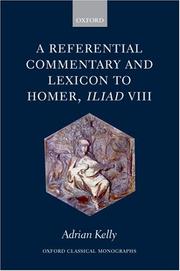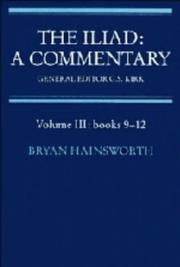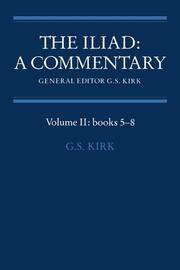| Listing 1 - 10 of 27 | << page >> |
Sort by
|

ISBN: 9780199203550 0199203555 019156866X 1429498358 0191988812 9780191568664 9781429498357 Year: 2007 Volume: *42 Publisher: Oxford New York Oxford University Press
Abstract | Keywords | Export | Availability | Bookmark
 Loading...
Loading...Choose an application
- Reference Manager
- EndNote
- RefWorks (Direct export to RefWorks)
Adrian Kelly shows that familiarity with the oral background of Homeric poetry is vital for a proper appreciation of Homeric narrative. He presents the kind of information a modern reader requires to become as fluent in traditional epic poetry as an original ancient audience. - ;This book aims to provide the reader of Homer with the traditional knowledge and fluency in Homeric poetry which an original ancient audience would have brought to a performance of this type of narrative. To that end, Adrian Kelly presents the text of Iliad VIII next to an apparatus referring to the traditional units b
Epic poetry, Greek --- Achilles (Greek mythology) in literature. --- Trojan War --- History and criticism. --- Literature and the war. --- Homer. --- Achilles --- Achìe --- Achilas --- Achille --- Achilleus --- Achilli --- Ahil --- Ahile --- Ahilej --- Ahillejs --- Aĥilo --- Aichill --- Akhilles --- Akhilleus --- Akhilleusz --- Akiles --- Akili --- Akille --- Akilles --- Akkilles --- Aquiles --- Aquilles --- Axill --- Axilles --- Ἀχιλλεύς --- آخيل --- アキレウス --- Akireusu --- 아킬레우스 --- 阿喀琉斯 --- Ахіл --- Ахил --- Ахилл --- Akhill --- Ахіллес --- אכילס --- Akhiles --- In literature.

ISBN: 0521237114 0521281733 0511518382 Year: 1993 Publisher: Cambridge Cambridge University Press
Abstract | Keywords | Export | Availability | Bookmark
 Loading...
Loading...Choose an application
- Reference Manager
- EndNote
- RefWorks (Direct export to RefWorks)
This is the third volume in the major six-volume Commentary on Homer's Iliad prepared under the General Editorship of Professor G. S. Kirk. It opens with two introductory chapters: the first on Homeric diction (on which emphasis is maintained throughout the Commentary); the second on the contributions that comparative studies have made to seeing the Homeric epics in sharper perspective. In the commentary Dr Hainsworth confronts in an intentionally even-handed manner the serious problems posed by the ninth, tenth and twelfth books of The Iliad, seeking by means of a succinct discussion and a brief bibliography of recent contributions to furnish the user with a point of entry into the often voluminous scholarship devoted to these questions. The Greek text is not included.
Homer --- Arts and Humanities --- History --- Epic poetry, Greek --- Trojan War in literature. --- History and criticism. --- Homer. --- Achilles --- In literature. --- Achìe --- Achilas --- Achille --- Achilleus --- Achilli --- Ahil --- Ahile --- Ahilej --- Ahillejs --- Aĥilo --- Aichill --- Akhilles --- Akhilleus --- Akhilleusz --- Akiles --- Akili --- Akille --- Akilles --- Akkilles --- Aquiles --- Aquilles --- Axill --- Axilles --- Ἀχιλλεύς --- آخيل --- アキレウス --- Akireusu --- 아킬레우스 --- 阿喀琉斯 --- Ахіл --- Ахил --- Ахилл --- Akhill --- Ахіллес --- אכילס --- Akhiles --- Trojan War --- Mythology, Greek
Book
ISBN: 9780199326105 9780199326112 0199326118 019932610X 9780199925865 9780199925872 0199925860 9780199925865 0199925879 9780199925872 1299821626 9781299821620 0199326126 0199348502 0191988855 9780191988851 Year: 2014 Publisher: New York
Abstract | Keywords | Export | Availability | Bookmark
 Loading...
Loading...Choose an application
- Reference Manager
- EndNote
- RefWorks (Direct export to RefWorks)
Homer's Iliad is one of the foundational texts of Western Civilization. The timelessness of its story, of men battling fate amidst the horrors of war, still stirs the imaginations of readers year after year. What is offered here is the first translation by someone who is both an eminent scholar and published poet. Based on his thorough familiarity with Homeric language, Powell's free verse translation preserves the clarity and simplicity of the original, while recreating the original feel and sound of the oral-formulaic style. By avoiding the stylistic formality of earlier translations, and th
Epic poetry, Greek --- Trojan War --- Achilles --- Achìe --- Achilas --- Achille --- Achilleus --- Achilli --- Ahil --- Ahile --- Ahilej --- Ahillejs --- Aĥilo --- Aichill --- Akhilles --- Akhilleus --- Akhilleusz --- Akiles --- Akili --- Akille --- Akilles --- Akkilles --- Aquiles --- Aquilles --- Axill --- Axilles --- Ἀχιλλεύς --- آخيل --- アキレウス --- Akireusu --- 아킬레우스 --- 阿喀琉斯 --- Ахіл --- Ахил --- Ахилл --- Akhill --- Ахіллес --- אכילס --- Akhiles --- Achilles (Greek mythology) --- Epic poetry, Greek. --- Greek epic poetry --- Epic poetry, Classical --- Greek poetry --- Achilles (Mythological character)
Book
ISBN: 1775411729 9781775411727 9781775411727 1775563065 9781775563068 Year: 2008 Publisher: [Waiheke Island] : Floating Press,
Abstract | Keywords | Export | Availability | Bookmark
 Loading...
Loading...Choose an application
- Reference Manager
- EndNote
- RefWorks (Direct export to RefWorks)
An epic tale of love and betrayal, war and hope The Iliad is the first of two legendary ancient poems attributed to the Greek bard Homer. Typically dated between the 8th and 7th centuries BC it is believed by many to be the earliest extant piece of European literature. The poem deals with the exploits of Agamemnon, Odysseus, Achilles, Ajax and their comrades in the final year of their siege of the city of Troy.
Epic poetry, Greek --- Greeks --- Mythology, Greek --- Trojan War --- Achilles --- Achìe --- Achilas --- Achille --- Achilleus --- Achilli --- Ahil --- Ahile --- Ahilej --- Ahillejs --- Aĥilo --- Aichill --- Akhilles --- Akhilleus --- Akhilleusz --- Akiles --- Akili --- Akille --- Akilles --- Akkilles --- Aquiles --- Aquilles --- Axill --- Axilles --- Ἀχιλλεύς --- آخيل --- アキレウス --- Akireusu --- 아킬레우스 --- 阿喀琉斯 --- Ахіл --- Ахил --- Ахилл --- Akhill --- Ахіллес --- אכילס --- Akhiles --- Troy (Extinct city)
Book
ISBN: 1443846740 9781443846745 1847183530 Year: 2007 Publisher: Newcastle, UK : Cambridge Scholars Publishing,
Abstract | Keywords | Export | Availability | Bookmark
 Loading...
Loading...Choose an application
- Reference Manager
- EndNote
- RefWorks (Direct export to RefWorks)
Publius Papinius Statius was born in Neapolis (Naples) in about AD 50. The twelve books of his magnum opus, the Thebaid, were published in ca. 92. The Achilleid was begun in ca. 95 and left unfinished at his death in ca. 96. The present work, in three volumes, offers a revised text of the two epics with an apparatus criticus (volume I), a prose translation (volume II), and an extensive secondary apparatus accompanied by discussion of the manuscripts and previous editions (volume III). ...
Seven against Thebes (Greek mythology) --- Epic poetry, Latin --- Achilles --- Achìe --- Achilas --- Achille --- Achilleus --- Achilli --- Ahil --- Ahile --- Ahilej --- Ahillejs --- Aĥilo --- Aichill --- Akhilles --- Akhilleus --- Akhilleusz --- Akiles --- Akili --- Akille --- Akilles --- Akkilles --- Aquiles --- Aquilles --- Axill --- Axilles --- Ἀχιλλεύς --- آخيل --- アキレウス --- Akireusu --- 아킬레우스 --- 阿喀琉斯 --- Ахіл --- Ахил --- Ахилл --- Akhill --- Ахіллес --- אכילס --- Akhiles --- Achilles (Greek mythology)
Book
ISBN: 1107226058 1299319009 1139805754 1139805738 110731772X 1139805770 1139029908 9781139805735 9781139029902 9780521883320 0521883326 9780521709774 0521709776 9781107226050 9781299319004 9781139805759 9781139805773 113981074X Year: 2012 Publisher: Cambridge New York Cambridge University Press
Abstract | Keywords | Export | Availability | Bookmark
 Loading...
Loading...Choose an application
- Reference Manager
- EndNote
- RefWorks (Direct export to RefWorks)
Book XXII recounts the climax of the Iliad: the fatal encounter between the main defender of Troy and the greatest warrior of the Greeks, which results in the death of Hector and Achilles' revenge for the death of his friend Patroclus. At the same time it adumbrates Achilles' own death and the fall of Troy. This edition will help students and scholars better appreciate this key part of the epic poem. The introduction summarises central debates in Homeric scholarship, such as the circumstances of composition and the literary interpretation of an oral poem, and offers synoptic discussions of the structure of the Iliad, the role of the narrator, similes and epithets. There is a separate section on language, which provides a compact list of the most frequent Homeric characteristics. The commentary offers up-to-date linguistic guidance, and elucidates narrative techniques, typical elements and central themes.
Achilles (Greek mythology) --- Trojan War --- Homer. --- Achilles --- Achìe --- Achilas --- Achille --- Achilleus --- Achilli --- Ahil --- Ahile --- Ahilej --- Ahillejs --- Aĥilo --- Aichill --- Akhilles --- Akhilleus --- Akhilleusz --- Akiles --- Akili --- Akille --- Akilles --- Akkilles --- Aquiles --- Aquilles --- Axill --- Axilles --- Ἀχιλλεύς --- آخيل --- アキレウス --- Akireusu --- 아킬레우스 --- 阿喀琉斯 --- Ахіл --- Ахил --- Ахилл --- Akhill --- Ахіллес --- אכילס --- Akhiles --- Arts and Humanities --- History

ISBN: 1316038858 0511620276 0521237106 0521281725 9780511620270 9780521237109 9780521281720 Year: 1990 Publisher: Cambridge : Cambridge University Press,
Abstract | Keywords | Export | Availability | Bookmark
 Loading...
Loading...Choose an application
- Reference Manager
- EndNote
- RefWorks (Direct export to RefWorks)
This is the second volume in the major six-volume commentary on The Iliad now being prepared under the general editorship of Professor Kirk. Volume I was published in 1985. As before the volume consists of four introductory essays followed by the commentary itself. The Greek text is not included. This project is the first large-scale commentary on The Iliad for nearly 100 years, and takes special account of language, style and thematic structure as well as of the complex social and cultural background to the work.
Arts and Humanities --- History --- Homer. --- Achilles --- Achìe --- Achilas --- Achille --- Achilleus --- Achilli --- Ahil --- Ahile --- Ahilej --- Ahillejs --- Aĥilo --- Aichill --- Akhilles --- Akhilleus --- Akhilleusz --- Akiles --- Akili --- Akille --- Akilles --- Akkilles --- Aquiles --- Aquilles --- Axill --- Axilles --- Ἀχιλλεύς --- آخيل --- アキレウス --- Akireusu --- 아킬레우스 --- 阿喀琉斯 --- Ахіл --- Ахил --- Ахилл --- Akhill --- Ахіллес --- אכילס --- Akhiles --- Homer --- In literature. --- Epic poetry, Greek --- Trojan War --- History and criticism. --- Literature and the war.

ISBN: 1316038866 0511620241 0521237122 0521281741 9780511620249 9780521237123 9780521281744 Year: 1992 Publisher: Cambridge : Cambridge University Press,
Abstract | Keywords | Export | Availability | Bookmark
 Loading...
Loading...Choose an application
- Reference Manager
- EndNote
- RefWorks (Direct export to RefWorks)
This, the fourth volume in the six-volume Commentary on The Iliad being prepared under the General Editorship of Professor G. S. Kirk, covers Books 13-16, including the Battle for the Ships, the Deception of Zeus and the Death of Patroklos. Three introductory essays discuss the role of Homer's gods in his poetry; the origins and development of the epic diction; and the transmission of the text, from the bard's lips to our own manuscripts. It is now widely recognised that the first masterpiece of Western literature is an oral poem; Professor Janko's detailed commentary aims to show how this recognition can clarify many linguistic and textual problems, entailing a radical reassessment of the work of Homer's Alexandrian editors. The commentary also explores the poet's subtle creativity in adapting traditional materials, whether formulae, typical scenes, mythology or imagery, so as best to move, inspire and entertain his audience, ancient and modern alike. Discussion of the poem's literary qualities and structure is, where possible, kept separate from that of more technical matters.
Arts and Humanities --- History --- Homer. --- Achilles --- Achìe --- Achilas --- Achille --- Achilleus --- Achilli --- Ahil --- Ahile --- Ahilej --- Ahillejs --- Aĥilo --- Aichill --- Akhilles --- Akhilleus --- Akhilleusz --- Akiles --- Akili --- Akille --- Akilles --- Akkilles --- Aquiles --- Aquilles --- Axill --- Axilles --- Ἀχιλλεύς --- آخيل --- アキレウス --- Akireusu --- 아킬레우스 --- 阿喀琉斯 --- Ахіл --- Ахил --- Ахилл --- Akhill --- Ахіллес --- אכילס --- Akhiles --- Homer --- In literature. --- Epic poetry, Greek --- Trojan War --- History and criticism. --- Literature and the war.
Book
ISBN: 051171162X 1108016863 Year: 2012 Publisher: Cambridge : Cambridge University Press,
Abstract | Keywords | Export | Availability | Bookmark
 Loading...
Loading...Choose an application
- Reference Manager
- EndNote
- RefWorks (Direct export to RefWorks)
Walter Leaf (1852-1927) was a banker and classicist, whose various positions as chairman of the Westminster Bank, founder of the London Chamber of Commerce and president of the Hellenic Society reflected his wide-ranging professional and scholarly interests. Leaf was educated at Harrow School and won a scholarship to Trinity College, Cambridge, in 1870. He became senior classic in 1874 and was elected to a fellowship the following year. As a scholar Leaf was concerned with uncovering the physical reality of the classical world, a stance which set him apart from Jane Harrison and the Cambridge Ritual School. Leaf's The Iliad, with introduction and notes, first appeared in two volumes (1886-1888), and was regarded for several decades as the best English edition of Homer's epic poem. Volume 1 of the 1900 edition comprises Leaf's preface, an introduction to books 1-12 of the poem, and the annotated text.
Trojan War --- Achilles --- Mythology, Greek --- Achìe --- Achilas --- Achille --- Achilleus --- Achilli --- Ahil --- Ahile --- Ahilej --- Ahillejs --- Aĥilo --- Aichill --- Akhilles --- Akhilleus --- Akhilleusz --- Akiles --- Akili --- Akille --- Akilles --- Akkilles --- Aquiles --- Aquilles --- Axill --- Axilles --- Ἀχιλλεύς --- آخيل --- アキレウス --- Akireusu --- 아킬레우스 --- 阿喀琉斯 --- Ахіл --- Ахил --- Ахилл --- Akhill --- Ахіллес --- אכילס --- Akhiles
Book
ISBN: 1108412963 9781108420082 9781108412964 1108420087 Year: 2022 Publisher: Cambridge Cambridge University Press
Abstract | Keywords | Export | Availability | Bookmark
 Loading...
Loading...Choose an application
- Reference Manager
- EndNote
- RefWorks (Direct export to RefWorks)
"The Iliad is organized according to two complementary, mutually reinforcing artistic principles, one related to its traditional narrative and mythological content, the other to its symmetrical form and to eighth-century aesthetic norms. The narrative moves linearly toward the death of Achilles and the fall of Troy, both of which, as Homer's audiences knew, will follow shortly after the burial of Hektor with which the Iliad concludes, and both of which are anticipated with increasing frequency in the course of the poem. In the mortal world of the Iliad, the movement toward death is a one-way movement, an overriding reality that lends the poem much of its power as a representation of the human condition. Nevertheless, as Aristotle observed, unlike other epic poets who told in chronological order everything that was supposed to have happened in the course of the events they described, Homer organized the Iliad and Odyssey thematically, rather than chronologically, each around a single subject - the wrath of Achilles and its consequences and the man Odysseus and his return home - and gave them an organic unity in which, in the case of the Iliad, the death of Achilles and fall of Troy have no place. Even so, most events in the poem are told in the order in which they occur; there is nothing like the extraordinarily complex narrative form of the Odyssey, with its multiple plots, its movement back and forth in time, its numerous internal narrators and narrative perspectives, and its constant change of locale"--
Homer. - Iliad. - Book 1 --- Trojan War --- Homer. --- Achilles --- Achìe --- Achilas --- Achille --- Achilleus --- Achilli --- Ahil --- Ahile --- Ahilej --- Ahillejs --- Aĥilo --- Aichill --- Akhilles --- Akhilleus --- Akhilleusz --- Akiles --- Akili --- Akille --- Akilles --- Akkilles --- Aquiles --- Aquilles --- Axill --- Axilles --- Ἀχιλλεύς --- آخيل --- アキレウス --- Akireusu --- 아킬레우스 --- 阿喀琉斯 --- Ахіл --- Ахил --- Ахилл --- Akhill --- Ахіллес --- אכילס --- Akhiles
| Listing 1 - 10 of 27 | << page >> |
Sort by
|

 Search
Search Feedback
Feedback About UniCat
About UniCat  Help
Help News
News